Our communication to one another in the community of the Messiah needs to be handled with care and sensitivity but also with courage and boldness. We read in the book of Ecclesiastes:
There is an appointed time for everything. And there is a time for every event under heaven…A time to be silent and a time to speak. – Ecclesiastes 3:1,7
Silence has its place in our communication with one another, however, we need to learn when to speak and when to be silent. This subject of silence and its power in communication is at the heart of the first chapter of this week’s Torah Portion.
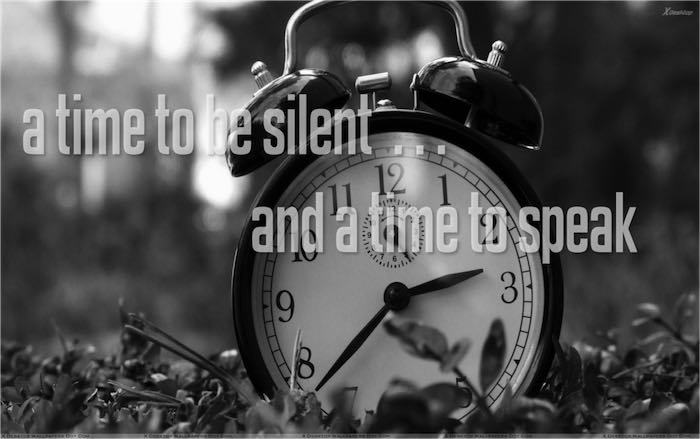
Vows to the LORD
As we begin to read this week’s Torah Portion we are immediately confronted with the subject of vows. There is a stern warning in the beginning of this section of Scripture to be faithful to the vows that one makes:
If a man makes a vow to the LORD, or takes an oath to bind himself with a binding obligation, he shall not violate his word; he shall do according to all that proceeds out of his mouth. – Num. 30:2
This command is simple and straightforward. It is a clear declaration to be true to one’s word and actions without compromise.
When Yeshua walked this earth during His ministry years, He spoke into this commandment and this subject of vows:
Again, you have heard that the ancients were told, ‘You shall not make false vows, but shall fulfill your vows to the LORD.’ But I say to you, make no oath at all, either by heaven, for it is the throne of God, or by the earth, for it is the footstool of His feet, or by Jerusalem, for it is the city of the great King. Nor shall you make an oath by your head, for you cannot make one hair white or black. But let your statement be, ‘Yes, yes’ or ‘No, no’; anything beyond these is of evil. – Matt. 5:33-37
It is human nature to want to add to God’s Word and somehow think that someone could possibly improve it. This is one of the issues Yeshua was addressing in His statement on vows.
Men had added the condition of making vows by heaven, by earth, by Jerusalem, or by whatever means to try to make their vows more serious. Yeshua rebuked this practice and commanded His followers to be true to the Word of God and to God Himself by simply saying Yes or No! Yeshua was reaffirming this commandment in Numbers, “…he shall do according to all that proceeds out of his mouth” (Num. 30:2). We don’t need to make flowery vows. We simply need to speak the truth and do what we say.
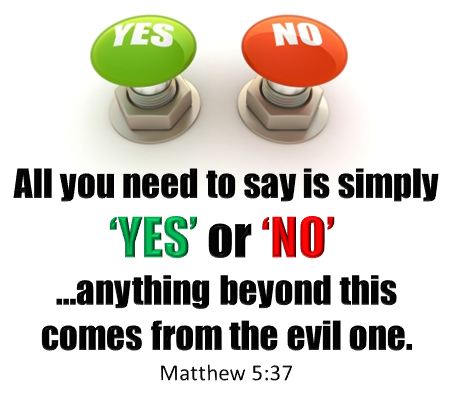
Authority of Vows
As we return to the context of Numbers 30, it is interesting to note that outside of the one verse quoted above, the remainder of the chapter focuses on the subject of a woman who makes a vow and how her vow can be broken by the authority over her:
Also if a woman makes a vow to the LORD, and binds herself by an obligation in her father’s house in her youth, and her father hears her vow and her obligation by which she has bound herself, and her father says nothing to her, then all her vows shall stand and every obligation by which she has bound herself shall stand. But if her father should forbid her on the day he hears of it, none of her vows or her obligations by which she has bound herself shall stand; and the LORD will forgive her because her father had forbidden her. However, if she should marry while under her vows or the rash statement of her lips by which she has bound herself, and her husband hears of it and says nothing to her on the day he hears it, then her vows shall stand and her obligations by which she has bound herself shall stand. But if on the day her husband hears of it, he forbids her, then he shall annul her vow which she is under and the rash statement of her lips by which she has bound herself; and the LORD will forgive her. – Num. 30:3-8
There is a clear line of authority that is presented in this commandment on vows regarding a woman, whether under the authority of her father (for an unmarried woman) or her husband (for a married woman). The father or a husband of a woman has the right to affirm or annul a vow that a woman makes who is under his authority. If he clearly forbids a vow upon hearing it, than it will be annulled, however if he remains silent, than he confirms the vow.
Order in the Home
One obvious principle to be taken from this commandment concerning vows is the order of authority in the home, which was established by God. Within the family unit God has established the husband and the father as the authority in the home, who is under the authority of God Himself. We see this same principle being taught in the New Testament:
Be imitators of me, just as I also am of Christ. Now I praise you because you remember me in everything and hold firmly to the traditions, just as I delivered them to you. But I want you to understand that Christ is the head of every man, and the man is the head of a woman, and God is the head of Christ. – 1 Corinthians 11:1-3
There is a clear line of authority that is emphasized in these verses between God and humankind. This authority practically works itself out in the home through the man being the head of his home, especially in connection to spiritual life and vows before God.
The Bible provides very practical guidelines for how to best live life on this earth in relation to one another and in relation to God Himself. The moral code and the order of authority which are taught in the Bible provide the basis for civilization as we know it. Any deviation from the biblical blueprint leads to idolatry and a breakdown of the family unit.
The Power of Silence
A second principle that we can learn from this teaching in Numbers 30 is the power of communication. The husband or father of a home is to listen carefully to what is being communicated in his home, especially by his wife or daughter. If he hears his wife or daughter make a vow that is harmful or damaging to herself or others than he needs to communicate this and annul her words. If on the other hand he agrees with what she has stated, than he needs to communicate this or simply remain silent. By his silence a father or a husband communicates that he agrees with and confirms the words which are spoken.
We see this principle of agreement and affirmation through silence being repeated again and again in Numbers chapter 30:
Every vow and every binding oath to humble herself, her husband may confirm it or her husband may annul it. But if her husband indeed says nothing to her from day to day, then he confirms all her vows or all her obligations which are on her; he has confirmed them, because he said nothing to her on the day he heard them. – Num. 30:13-14
A husband or father’s silence communicates confirmation. The Hebrew word for silence is actually used six times in this chapter and three times in verse 14 alone, but this is hidden in the English translation.
As we take a closer look at verse 14, the original Hebrew for the phrase, “But if her husband indeed says nothing to her” is “ואם החרש יחרש לה אישה” – “ve’im hacharesh yacharish la isha” and is literally translated as “and if her husband is absolutely silent…” The Hebrew provides a compound use of the Hebrew word “חרש” – “charash” which means “to be silent.” The double use of the word “חרש” – “charash” signifies emphasis and demands the emphatic. This same word is used again at the end of the verse, “כי החרש לה ביום שמעו” – “because he was silent to her on the day he heard them.” Silence can be a powerful form of communication.
During my research and preparation for this week’s study I came across the following commentary on the verses quoted above:
There is a talmudic principle that if a person remains silent when he has the opportunity to protest, it is regarded as if he affirms the act – Jonas, Irwin. Onkelos on the Torah, Numbers. Gefen Books. p. 273
In the face of something that should be protested against, silence is viewed as affirmation.
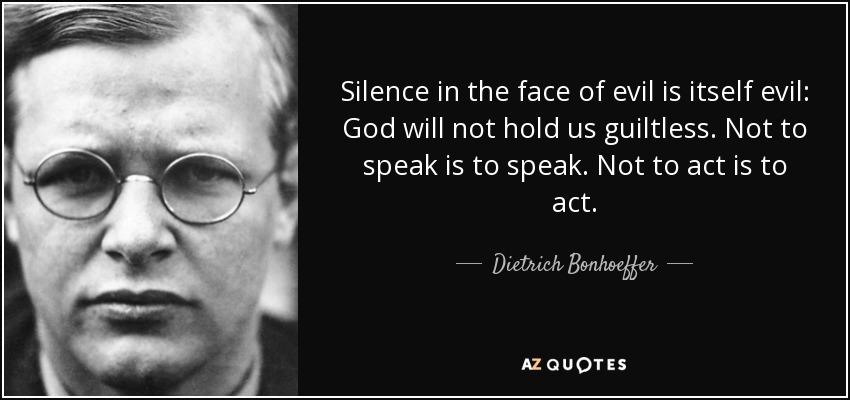
Silence Communicates Affirmation
As we evaluate how vows can be confirmed or annulled through communicating one way or another, we see clearly that there is no middle ground, either one speaks out and forbids a certain vow or verbally confirms it. If one remains silent than this is also a form of affirmation. I believe that this is an important point to be understood not just in regard to vows but also in regard to how we relate to one another. When one remains silent about a certain issue at hand, silence can communicate affirmation and confirmation to others regarding this issue.
One of the greatest dangers in using silence as a form of communication is when one doesn’t agree with something that is said, however, out of fear or curiosity one remains silent. This can be construed as affirmation and can lead to great destruction. We see this illustrated many times in the Bible, starting at the very beginning.
Original Silence
The first and best illustration of silence as a means of affirmation is in the Garden of Eden. We all know the story of Adam and Eve and their sin of eating from the tree of the knowledge of good and evil, from which they were forbidden to eat. When the LORD confronted Adam with his sin, He made it clear that his silence was wrong:
Then to Adam He said, “Because you have listened to the voice of your wife, and have eaten from the tree about which I commanded you, saying, ‘You shall not eat from it’; Cursed is the ground because of you; In toil you will eat of it all the days of your life. – Gen. 3:17
The LORD had specifically spoken to Adam about not eating from that particular tree. The serpent deceived Eve and she gave the fruit to her husband. Adam had the obligation to speak at that very moment but he chose to be silent. Through his silence he was affirming his wife’s words and actions and this led to their spiritual death, being cast forth from God’s presence.
Adam had a responsibility as the husband of his wife to rebuke the deceptive words of the serpent, to forbid her from eating of the tree, and to refuse this deceptive word himself. Adam failed through his silence and God rebuked him for listening to the voice of his wife while rejecting the words of God. Adam’s silence brought death and a curse upon his wife, upon himself, and upon all creation. We must never forget that silence is a form of communication that we will be held responsible for!
The Silence of Jacob
Another example of silence that led to destruction and death is found in the story of Jacob and his family when they had settled near the city of Shechem. Jacob’s daughter went to visit the other young ladies in the land and was raped by the prince of that land, Shechem the son of Hamor (Gen. 34:1-4). Jacob’s reaction to this situation when he heard of it is described in this manner:
Now Jacob heard that he had defiled Dinah his daughter; but his sons were with his livestock in the field, so Jacob kept silent until they came in. – Gen. 34:5
The phrase “so Jacob kept silent” in Hebrew is “והחרש יעקב” – “ve’hecherish Yakov.” We read in this verse the same word “חרש” – “charash,” which means “to be silent,” which is also used six times in Numbers 30.
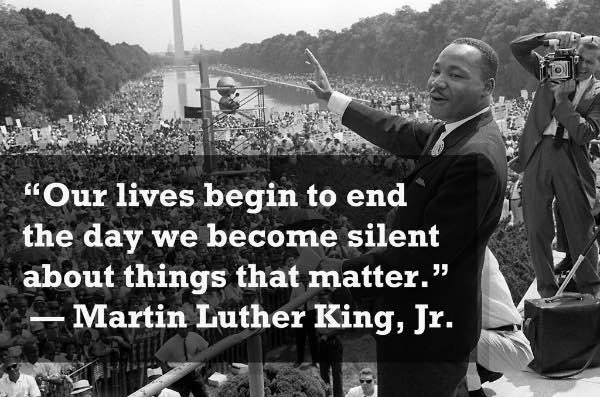
The Danger of Silence
Jacob’s silence regarding this horrific situation with his own daughter led his sons, Dinah’s brothers, to be deceptive towards their father and the men of Shechem. Simeon and Levi slaughtered all the men of Shechem and took their sister back (Gen. 34:6-29).
Jacob was angry at his sons and rebuked them for bringing this great slaughter in the land but Simeon and Levi told him that they were fighting for their sister’s honor (Gen. 34:30-31). Jacob’s silence led to a break down of authority in his own home which ultimately brought destruction upon the people in the land.
Silence can be one of the most destruction forms of communication if we are not careful. We must be attentive and mindful of the communication in our families and communities and not allow silence to be a permissive and destructive force in our midst.
The Obligation to Speak
When God first called Ezekiel as a prophet to the house of Israel in captivity, He explained to Ezekiel that He was sending him to a stiff-necked and stubborn people (Ezek. 3:4-11). The LORD clearly told Ezekiel that it didn’t matter how they responded, he still had a responsibility to speak the Word of God to them: Go to the exiles, to the sons of your people, and speak to them and tell them, whether they listen or not, ‘Thus says the Lord GOD.’ – Ezek. 3:11
God further told Ezekiel that in his responsibility for communicating God’s message to the people, he would be held fully responsible for delivering the message:
Son of man, I have appointed you a watchman to the house of Israel; whenever you hear a word from My mouth, warn them from Me. When I say to the wicked, ‘You will surely die,’ and you do not warn him or speak out to warn the wicked from his wicked way that he may live, that wicked man shall die in his iniquity, but his blood I will require at your hand. Yet if you have warned the wicked and he does not turn from his wickedness or from his wicked way, he shall die in his iniquity; but you have delivered yourself. – Ezek. 3:17-19
There was no escaping the obligation to speak God’s Word. Silence was not an option. If Ezekiel failed to communicate God’s Word to the people of Israel he would be held responsible before God.
What is our responsibility in speaking God’s Word today?
I believe that this is a vital question that we need to be asking ourselves, especially in the community of believers. We live in a day and age when independence and tolerance is highly valued. There is often the mindset that what one does in his or her private life doesn’t matter, as long as it doesn’t bother someone else. Is this a viable option? What responsibility do we have to one another as the community of God in Yeshua the Messiah?
Responsibility in the Community
Within the context of community life in the Messiah, Yeshua gave us a very specific charge to reprove the brother or sister in our midst who is sinning in some way:
If your brother sins, go and show him his fault in private; if he listens to you, you have won your brother. But if he does not listen to you, take one or two more with you, so that by the mouth of two or three witnesses every fact may be confirmed. If he refuses to listen to them, tell it to the church; and if he refuses to listen even to the church, let him be to you as a Gentile and a tax collector. Truly I say to you, whatever you bind on earth shall have been bound in heaven; and whatever you loose on earth shall have been loosed in heaven. Again I say to you, that if two of you agree on earth about anything that they may ask, it shall be done for them by My Father who is in heaven. For where two or three have gathered together in My name, I am there in their midst. – Matt. 18:15-20
We have a very real responsibility to one another to speak into each others lives, especially in regard to keeping one another in check in relation to our words and actions. This is not a license to institute Messianic Sharia Law, but rather an encouragement to see one another walk in holiness and to maintain our relationships with one another and with our Father in heaven.
Binding and Loosening in His Name
In the verses quoted above from Matthew 18, I have included the latter verses which speaks of “binding and loosening.” I’ve never noticed this before, however, I see it clearly now that this “binding and loosening” is in the context of confronting sin and of keeping one another accountable.
I often hear believers in Yeshua speak about “binding and loosening” in the context of casting out demons, however, I don’t think I’ve ever heard someone speak of “binding and loosening” in the context of reproof for sin in the life of another believer. The Greek words for “binding and loosening” are also translated as “forbidding and permitting,” which correlates well with our study in Numbers 30.
We have been commissioned by Yeshua to speak into one another’s lives for the purpose of holiness in the community of believers. Yeshua has given each one of us authority in this matter of confronting the sin of another believer and He has also provided for us safeguards and accountability by instructing us to call in witnesses when needed.
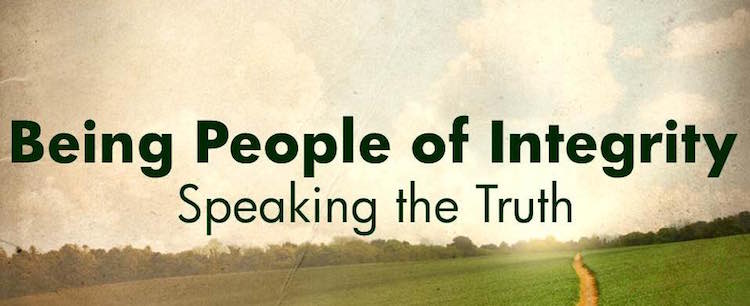
Don’t Be Silent
Confronting the sin of another believer is not the most desirable responsibility in the Kingdom of God but it is part of community life. We need to consider how to implement this in our lives and in our communities in a way that brings healing and life and not condemnation. We read this encouragement in the book of James:
My brethren, if any among you strays from the truth and one turns him back, let him know that he who turns a sinner from the error of his way will save his soul from death and will cover a multitude of sins. – James 5:19-20
Although it is uncomfortable to confront another about sin, it is important to remember that by doing so we can literally be a part in leading someone back to the path of life and keep them from a multitude of sins. Let us pursue life in the Body of Messiah and not be unnecessarily silent!
Shabbat Shalom!
If you enjoyed reading this article, share it today with friends! We also invite you to sign up for our weekly Torah Portion commentary on the sidebar to the right.
Help keep our weekly commentaries free and available to all. Click here to donate today:
Torah Portion: Num. 30:1 – Num. 32:42
Haftara: Jeremiah 1:1 – Jeremiah 2:3
Return to Torah Portion Homepage
Copyright Jewels of Judaism. All rights reserved 2016


